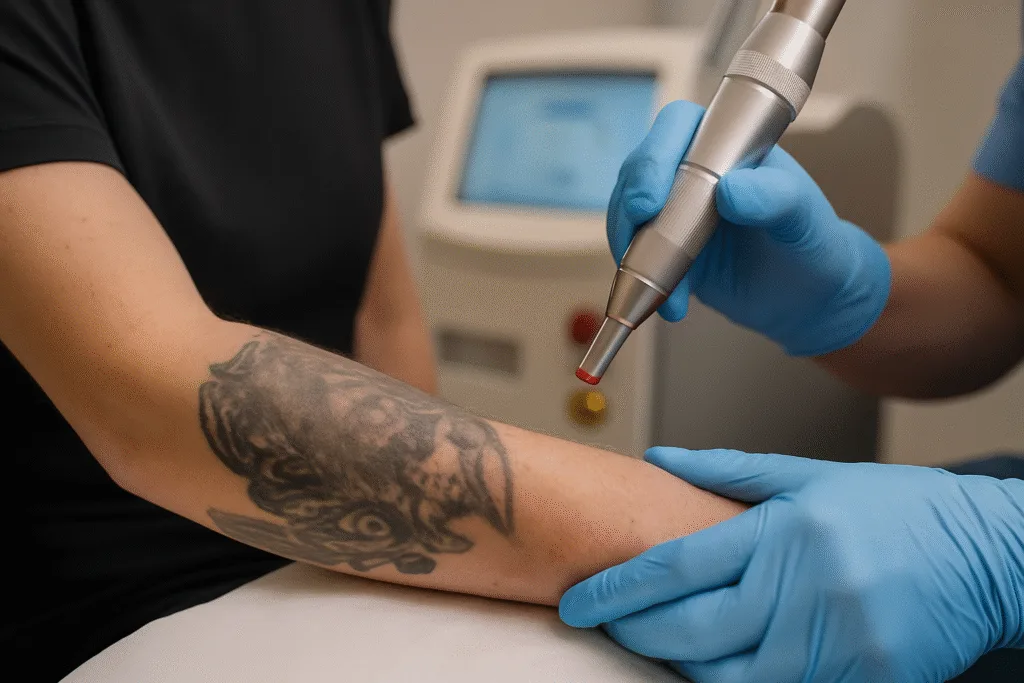If you’re thinking about getting a tattoo removed, it’s totally natural to wonder: Does tattoo removal leave scars? The good news is that when done properly, laser tattoo removal typically does not scar the skin. But there are a few key factors that influence the outcome.
In this post, we’ll break down what actually causes scarring, how to avoid it, and what to expect during the healing process.
Laser Tattoo Removal Itself Doesn’t Scar Skin

Laser technology—especially modern Q-switched and picosecond lasers—targets ink particles beneath the skin, not the skin itself. When performed by trained professionals, the laser doesn’t cut, burn, or damage the surface of your skin.
So where does scarring come from? Typically, it’s not from the laser—it’s from how the body reacts afterward. The answer to “does tattoo removal leave scars” usually depends on factors beyond the laser itself.
What Can Cause Scarring?
Scarring is usually the result of one of the following:
- Improper aftercare (picking scabs, popping blisters, overexposure to sun)
- Infection due to bacteria or dirty environments post-treatment
- Low-quality or outdated lasers that overheat or damage the skin
- Too much energy or poor technique from undertrained technicians
- Pre-existing scars that were part of the original tattoo
If you’re worried and asking, “does tattoo removal leave scars,” understanding these risk factors is the first step toward preventing issues.
How to Prevent Scarring After Removal
At Black Sage Laser, we take every step to prevent scarring and promote clean healing:
- We use industry-standard, skin-safe lasers
- Our treatments are spaced out to allow proper healing between sessions
- Clients receive detailed aftercare instructions—including how to clean, protect, and moisturize the area
Some key tips:
- Don’t pick at scabs or blisters
- Keep the area clean and dry in the first 48 hours
- Avoid sun exposure—UV rays increase the risk of pigment damage
- Use natural aftercare products (we love aloe vera for its soothing, healing properties)
For those wondering, does tattoo removal leave scars, the answer is typically no—if you follow proper healing protocols.
The Role of Your Immune System in Healing
Another important factor is your body’s natural ability to heal. A strong immune system helps clear broken ink particles more efficiently and also reduces the chances of complications like infections or prolonged inflammation. Staying well-hydrated, eating a nutrient-rich diet, and getting plenty of rest after your sessions can improve your overall results and decrease the likelihood of any visible scarring.
Additionally, some individuals naturally develop thicker scar tissue from even minor skin injuries. If you know your skin is prone to keloids or abnormal scarring, be sure to discuss this during your consultation. A qualified provider will customize your treatment plan to reduce these risks.
What If You Already Have a Scar From the Tattoo?
Sometimes people confuse pre-existing scarring from the original tattoo with laser side effects. If your tattoo already has raised lines or keloid tissue, laser won’t remove those scars—but we can work around them.
In some cases, fading the tattoo can actually make those older scars less noticeable.
What About Pigment Changes?
While not scarring, temporary pigment changes like lightening (hypopigmentation) or darkening (hyperpigmentation) can happen. These are more common in darker skin types or after aggressive early treatments—but they often fade over time.
We tailor every treatment to your skin type and adjust laser strength accordingly to reduce this risk.
Honest Care, No Damage
When done by an expert with proper equipment, tattoo removal shouldn’t leave behind damage. Our goal is always to clear your ink without compromising your skin.
If you’ve been asking, does tattoo removal leave scars, we’re here to give you clarity—and a scar-free experience whenever possible.
If you’re ready to start fading your tattoo safely, book a consultation. We’ll review your skin, assess any existing scarring, and walk you through your options step by step.
Have questions? Book a consultation and we’ll walk you through every step.

